How Angel Investors can Improve their Investment Decisions: The Art of Failing Forward
TL;DR: This blog post explores how angel investors can learn from their failures and experiences to refine their investment decisions and create a continuous feedback loop for growth. By embracing the learning curve, conducting rigorous postmortems, keeping an investment journal, seeking mentorship and collaboration, adapting and evolving their investment thesis, and staying informed and engaged, angel investors can turn setbacks into opportunities and make more informed investment decisions in the future.
Highlights:
- Failures can be valuable teachers for angel investors.
- Embracing the learning curve and adopting a growth mindset can lead to insights and better decision-making.
- Conducting thorough postmortems and objectively analyzing decisions can uncover weaknesses and refine the investment approach.
- Keeping an investment journal allows for tracking progress, identifying patterns, and applying insights to future investments.
- Seeking mentorship and collaboration can provide access to experience and diverse perspectives.
- Adapting and evolving the investment thesis based on past failures leads to a more refined approach and better alignment with goals and risk tolerance.
- Staying informed and engaged with the latest developments in target industries enables better assessment of potential investments and more educated decision-making.
Learn how angel investors can refine their investment decisions and thesis based on failures and experience, creating an experience-based feedback loop for continuous growth.
Introduction:
In the world of angel investing, failures are inevitable, but they can also be valuable teachers. The most successful angel investors don't shy away from these lessons; instead, they embrace the art of failing forward. By leveraging their experiences, these investors can refine their investment decisions and develop a more robust thesis, ultimately leading to more lucrative investments. In this blog post, we'll explore how angel investors can create an experience-based feedback loop, allowing them to learn from their past failures and use this knowledge to make more informed decisions in the future.
Embrace the Learning Curve
First and foremost, it's essential for angel investors to acknowledge that the path to success is often paved with setbacks. Failure is not a sign of incompetence; rather, it's an opportunity for growth. By embracing the learning curve, investors can adopt a growth mindset and extract invaluable insights from each failed investment. As a result, they'll be better equipped to recognize patterns, identify red flags, and anticipate challenges.
Conduct Rigorous Postmortems
After experiencing a failed investment, it's crucial for angel investors to conduct a thorough postmortem analysis. This involves reviewing the decision-making process, identifying key factors that contributed to the failure, and examining the investor's initial thesis. By objectively analyzing their decisions, investors can uncover weaknesses in their strategy and develop a more refined approach moving forward.
Keep an Investment Journal
An investment journal serves as a powerful tool for angel investors looking to refine their decision-making process. By documenting successes, failures, and lessons learned, investors can effectively track their progress and identify patterns or trends. This historical record allows them to revisit past experiences and apply newfound insights to future investments, creating a continuous feedback loop that drives improvement.
Seek Mentorship and Collaboration
There's no substitute for experience, and by seeking out mentorship from seasoned angel investors, newcomers can tap into a wealth of wisdom. By openly discussing their failures and lessons learned, they can gain valuable insights that may help them avoid similar pitfalls in the future. Additionally, collaborating with other investors can lead to diverse perspectives and creative problem-solving, resulting in more informed investment decisions.
Adapt and Evolve Your Investment Thesis
As angel investors accumulate experience, it's vital that they continually refine their investment thesis. By incorporating lessons learned from past failures, they can adapt their approach and better align their investment strategy with their goals and risk tolerance. This agile mindset enables investors to be proactive in their decision-making and stay ahead of the curve in an ever-changing landscape.
Stay Informed and Engaged
Finally, to maximize the benefits of their experience-based feedback loop, angel investors must remain informed and engaged with the latest developments in their target industries. By staying up-to-date with trends, emerging technologies, and market shifts, they can better assess potential investments and make more educated decisions. Attending industry conferences, networking events, and actively participating in online communities can provide valuable insights and help refine investment decisions.
Conclusion:
Failure is an inevitable part of the angel investing journey, but by embracing the art of failing forward, investors can transform their setbacks into opportunities for growth. By conducting rigorous postmortems, maintaining an investment journal, seeking mentorship, adapting their investment thesis, and staying informed, angel investors can create a powerful experience-based feedback loop. This approach not only enables them to refine their investment decisions but also leads to continuous improvement and, ultimately, a more successful and rewarding investment portfolio.
Embrace the wisdom of experience and failure, and let it guide you toward making better-informed investment decisions in the future. In the ever-evolving world of angel investing, the ability to learn, adapt, and grow is the key to unlocking long-term success.



